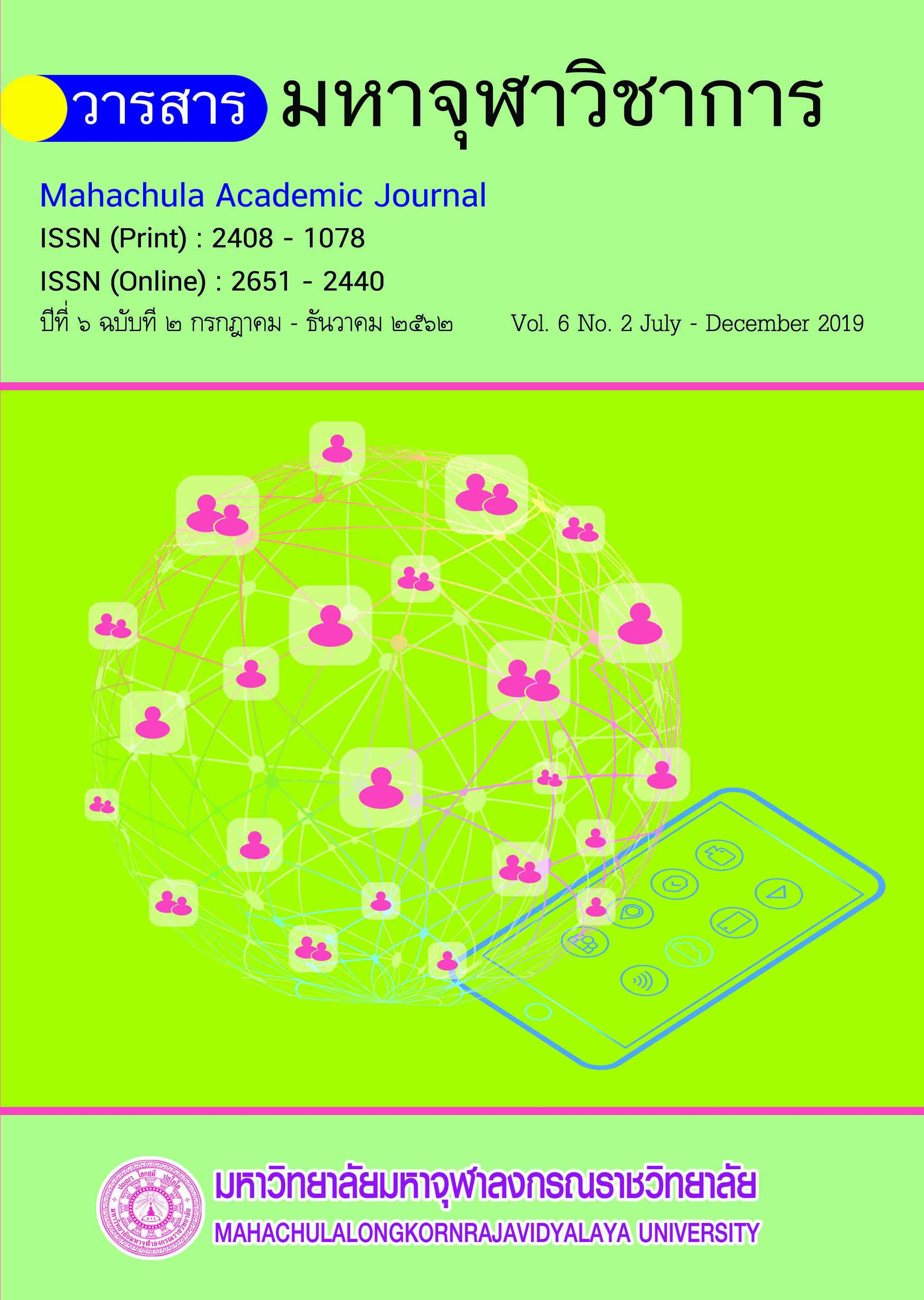The Development of Peace Engeneers by Bhavana 4
Main Article Content
Abstract
This article aimed at reflecting the interest and desire to be an engineer peace has mastered the principle, an important development on the way of Buddhism which developed the quality of engineers peace, using the conceptual framework is Bhavana four awareness can be faced with all the conflict towards the development of the 4 sides, and step by step is the development of moral and cohabitation, to achieve peace and harmony, increase in social scientists, engineers, peace, good, you inevitably open up, listen, and patience, in all cases, to train them through all the training process, because the word engineer peace is the Creator of life, mentally, so it must be through the practice of concentration, whether it is meditation or walking meditation however, is mindfulness practice according to Bhavana four is important and extremely necessary before leaving to establish a relationship to one organization, it needs to start at the body of students in peace studies each of you own will, an open mind, participate, develop, and step into the build process of reconciliation, both also going to the self-development of engineers, peace give birth opinion straight, clear, and accurate understand the nature of the conflict and the above problem incoming in all cases, when we need to deal with conflict consciously, all the time by not accidentally as part of the problem. it should have a stage is primarily justified quote: the dismissal of its adherence to its stand presence in the mercy with the principles within it will guide the development of engineers, peace, great joy and permanent, it will be able to stop the conflict and existing conflict issues other are formed in the manner of awakening to know and protect both confident and sure that in the future such a society will have become a community or a rich social peace certainly
Article Details
References
กรมศาสนา กระทรวงวัฒนธรรม. แนวทางการดำเนินงานการสร้างความปรองดองสมานฉันท์ของคนในชาติด้วยมิติศาสนา. กรุงเทพมหานคร: กระทรวงวัฒนธรรม, ๒๕๕๗.
จำนงค์ อดิวัฒนสิทธิ์. สังคมวิทยาตามแนวพุทธศาสตร์. กรุงเทพมหานคร: โรงพิมพ์มหาจุฬาลงกรณราชวิทยาลัย, ๒๕๔๔. หน้า ๑๖๑.
ชาติชาย พิทักษ์ธนาคม. “การพัฒนาพฤติกรรมตามหลักภาวนา ๔”. สารนิพนธ์พุทธศาสตรมหาบัณฑิต สาขาพุทธจิตวิทยา. บัณฑิตวิทยาลัย: มหาวิทยาลัยมหาจุฬาลงกรณราชวิทยาลัย, ๒๕๕๗. หน้า ๒๓๒.
โชติช่วง ทัพวงศ์. จัดการความขัดแย้งกับการไกล่เกลี่ยข้อพิพาท: ความรู้เบื้องต้นเกี่ยวกับการไกล่เกลี่ยข้อพิพาท. กรุงเทพมหานคร: สำนักข้อพิพาทศาลยุติธรรม, ๒๕๕๐. หน้า ๙๔.
พระธรรมปิฎก (ป.อ. ปยุตฺโต). การศึกษาเพื่อสันติภาพ. พิมพ์ครั้งที่ ๒. กรุงเทพมหานคร: บริษัท สหธรรมิก จำกัด, ๒๕๓๘.
พระธรรมปิฎก (ป.อ. ปยุตฺโต). พจนานุกรมพุทธศาสตร์ ฉบับประมวลธรรม. พิมพ์ครั้งที่ ๑๐. กรุงเทพมหานคร: สำนักพิมพ์ เอส. อาร์. พริ้นติ้ง แมส โปรดักส์, ๒๕๔๕.
พระพรหมคุณาภรณ์ (ป.อ. ปยุตโต). ธรรมะทวิพากย์ (Dhamma Bilingualized). ภาคที่ ๒ แปลโดย ดร.สมศีล ฌานวังศะ. กรุงเทพมหานคร: มปท., ๒๕๕๓.
พระธรรมปิฎก (ป.อ. ปยุตฺโต). พระพุทธศาสนากับวิทยาการสมัยใหม่. กรุงเทพมหานคร: โรงพิมพ์มหาจุฬาลงกรณราชวิทยาลัย, ๒๕๕๗.
พระธรรมปิฎก (ป.อ. ปยุตฺโต). พุทธธรรม ฉบับปรับปรุงและขยายความ. พิมพ์ครั้งที่ ๑๕. กรุงเทพมหานคร: บริษัท สหธรรมิก จำกัด, ๒๕๕๒.
พระธรรมปิฎก (ป.อ. ปยุตฺโต). พุทธธรรม. พิมพ์ครั้งที่ ๑๑. กรุงเทพมหานคร: โรงพิมพ์มหาจุฬาลงกรณราชวิทยาลัย, ๒๕๕๒.
พระมหาหรรษา ธมฺมหาโส. “รูปแบบแผนปฏิบัติการสันติวิธีเชิงพุทธ ศึกษากรณีการแก้ไขความขัดแย้งของชาวศากยะและชาวโกลิยะ”. สารนิพนธ์พุทธศาสตรดุษฎีบัณฑิต สาขาวิชาพุทธศาสตร์. บัณฑิตวิทยาลัย: มหาวิทยาลัยมหาจุฬาลงกรณราชวิทยาลัย, ๒๕๔๖.
มหาจุฬาลงกรณราชวิทยาลัย. พระไตรปิฎกฉบับภาษาไทย ฉบับมหาจุฬาลงกรณราชวิทยาลัย. กรุงเทพมหานคร: โรงพิมพ์มหาจุฬาลงกรณราชวิทยาลัย, ๒๕๓๙.
วันชัย วัฒนศัพท์. ความขัดแย้งหลักการและเครื่องมือแก้ปัญหา. พิมพ์ครั้งที่ ๔. ฉบับปรับปรุง. ขอนแก่น: สำนักพิมพ์คลังนานาวิทยา, ๒๕๕๕.
เสริมศักดิ์ วิศาลาภรณ์. ความขัดแย้ง : การบริหารเพื่อความสร้างสรรค์. กรุงเทพมหานคร: สำนักพิมพ์เลิฟ แอนด์ ลิฟ เพรส, ๒๕๔๐.
อมรเทพ แกล้วกสิกรรม. “การพัฒนาบุคคล”. วารสารโรงเรียนนายเรือ. ฉบับที่ ๑ (มกราคม–มีนาคม, ๒๕๔๙). (อัดสำเนา).
Virioli, Maurizio ([1988] 2003). Jean-Jacques Rousseau and the 'Well-Ordered Society'. Hanson, Derek, translator. Cambridge University Press, 2003.


